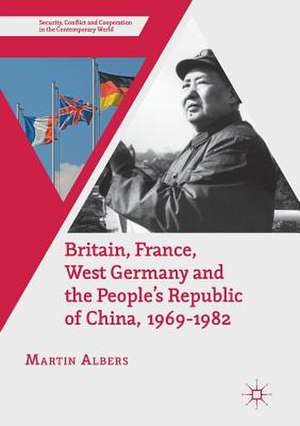Britain, France, West Germany and the People's Republic of China, 1969–1982: The European Dimension of China's Great Transition: Security, Conflict and Cooperation in the Contemporary World
Autor Martin Albersen Limba Engleză Paperback – 12 oct 2018
Based on newly declassified government files, readers will find such sources invaluable in understanding the argument that, despite pursuing very different policies, the three governments supported a rapid expansion of peaceful exchange between the People’s Republic and Europe and substantially contributed to the success of Beijing's reform policy.
Din seria Security, Conflict and Cooperation in the Contemporary World
- 9%
 Preț: 765.10 lei
Preț: 765.10 lei - 20%
 Preț: 689.80 lei
Preț: 689.80 lei - 20%
 Preț: 565.89 lei
Preț: 565.89 lei - 20%
 Preț: 629.10 lei
Preț: 629.10 lei - 18%
 Preț: 785.42 lei
Preț: 785.42 lei - 18%
 Preț: 775.15 lei
Preț: 775.15 lei -
 Preț: 386.61 lei
Preț: 386.61 lei - 15%
 Preț: 584.43 lei
Preț: 584.43 lei - 15%
 Preț: 693.25 lei
Preț: 693.25 lei - 15%
 Preț: 527.97 lei
Preț: 527.97 lei - 15%
 Preț: 638.25 lei
Preț: 638.25 lei -
 Preț: 384.86 lei
Preț: 384.86 lei -
 Preț: 481.43 lei
Preț: 481.43 lei -
 Preț: 384.09 lei
Preț: 384.09 lei -
 Preț: 383.12 lei
Preț: 383.12 lei -
 Preț: 391.61 lei
Preț: 391.61 lei - 15%
 Preț: 638.76 lei
Preț: 638.76 lei - 18%
 Preț: 778.45 lei
Preț: 778.45 lei - 15%
 Preț: 639.37 lei
Preț: 639.37 lei -
 Preț: 390.63 lei
Preț: 390.63 lei -
 Preț: 385.84 lei
Preț: 385.84 lei - 15%
 Preț: 586.55 lei
Preț: 586.55 lei -
 Preț: 385.25 lei
Preț: 385.25 lei -
 Preț: 383.33 lei
Preț: 383.33 lei - 18%
 Preț: 731.10 lei
Preț: 731.10 lei - 18%
 Preț: 891.80 lei
Preț: 891.80 lei - 15%
 Preț: 699.77 lei
Preț: 699.77 lei - 15%
 Preț: 703.20 lei
Preț: 703.20 lei - 15%
 Preț: 588.18 lei
Preț: 588.18 lei -
 Preț: 386.81 lei
Preț: 386.81 lei - 18%
 Preț: 786.36 lei
Preț: 786.36 lei - 15%
 Preț: 638.57 lei
Preț: 638.57 lei -
 Preț: 380.63 lei
Preț: 380.63 lei -
 Preț: 390.63 lei
Preț: 390.63 lei
Preț: 471.69 lei
Preț vechi: 554.93 lei
-15% Nou
Puncte Express: 708
Preț estimativ în valută:
90.29€ • 98.10$ • 75.89£
90.29€ • 98.10$ • 75.89£
Carte tipărită la comandă
Livrare economică 21 aprilie-05 mai
Preluare comenzi: 021 569.72.76
Specificații
ISBN-13: 9781349850037
ISBN-10: 1349850039
Pagini: 341
Ilustrații: XIX, 341 p.
Dimensiuni: 148 x 210 mm
Greutate: 0.44 kg
Ediția:1st ed. 2016
Editura: Palgrave Macmillan UK
Colecția Palgrave Macmillan
Seria Security, Conflict and Cooperation in the Contemporary World
Locul publicării:London, United Kingdom
ISBN-10: 1349850039
Pagini: 341
Ilustrații: XIX, 341 p.
Dimensiuni: 148 x 210 mm
Greutate: 0.44 kg
Ediția:1st ed. 2016
Editura: Palgrave Macmillan UK
Colecția Palgrave Macmillan
Seria Security, Conflict and Cooperation in the Contemporary World
Locul publicării:London, United Kingdom
Cuprins
Chapter One: Introduction.- Chapter Two: Historical Background to Sino-European Rapprochement in the 1970s.- Chapter Three: Western Europe and Détente in East Asia, 1969-1972.- Chapter Four: Promotion of European Exports to China and the Role of Economic Diplomacy, 1969-1972.- Chapter Five: The Diplomacy of High-Level Visits During The Twighlight of Maoism, 1973-1977.- Chapter Six: Widening and Deepening the Relationship with China before the Reforms, 1973-1977.- Chapter Seven: The'Alliance Era' and Strategic Cooperation with China, 1978-1982.- Chapter Eight: Promoting Transnational Exchange with China in the Age of Reform, 1978-1982.- Chapter Nine: Conclusion.
Notă biografică
Martin Albers works for the Administration of the Free and Hanseatic City of Hamburg, Germany. Previously he worked for the German think-tank Friedrich-Ebert-Stiftung (FES). He holds a PhD from Cambridge University and his research interests include twentieth-century European history and contemporary relations between Europe and Asia.
Textul de pe ultima copertă
This book shows how the China policies of the three biggest states in Europe – Britain, France, and the Federal Republic of Germany – helped China reintegrate into the international community in the 1970s.
With Europe being China’s most important trading partner, the economic and political significance of Sino-European relations is obvious. Yet very little is known about the history and origins of ties between Western Europe and the People’s Republic. Against the background of the Cold War, the end of Maoism, and the emergence of globalization, the governments in Bonn, Paris and London had to find ways of dealing with Europe’s declining influence and promote their own national interests in Asia.
Based on newly declassified government files, author Martin Albers argues that despite pursuing very different policies, these three governments supported a rapid expansion of peaceful exchange between the People’s Republic and Europe and substantially contributed to the success of Beijing's reform policy.
With Europe being China’s most important trading partner, the economic and political significance of Sino-European relations is obvious. Yet very little is known about the history and origins of ties between Western Europe and the People’s Republic. Against the background of the Cold War, the end of Maoism, and the emergence of globalization, the governments in Bonn, Paris and London had to find ways of dealing with Europe’s declining influence and promote their own national interests in Asia.
Based on newly declassified government files, author Martin Albers argues that despite pursuing very different policies, these three governments supported a rapid expansion of peaceful exchange between the People’s Republic and Europe and substantially contributed to the success of Beijing's reform policy.
Caracteristici
Expands readers’ understanding of Sino-European relations in the 1970s and 1980s. Casts light on the inextricable nature of economic and diplomatic affairs between the PRC and Western Europe. Judicious use of previously overlooked governmental primary sources.
